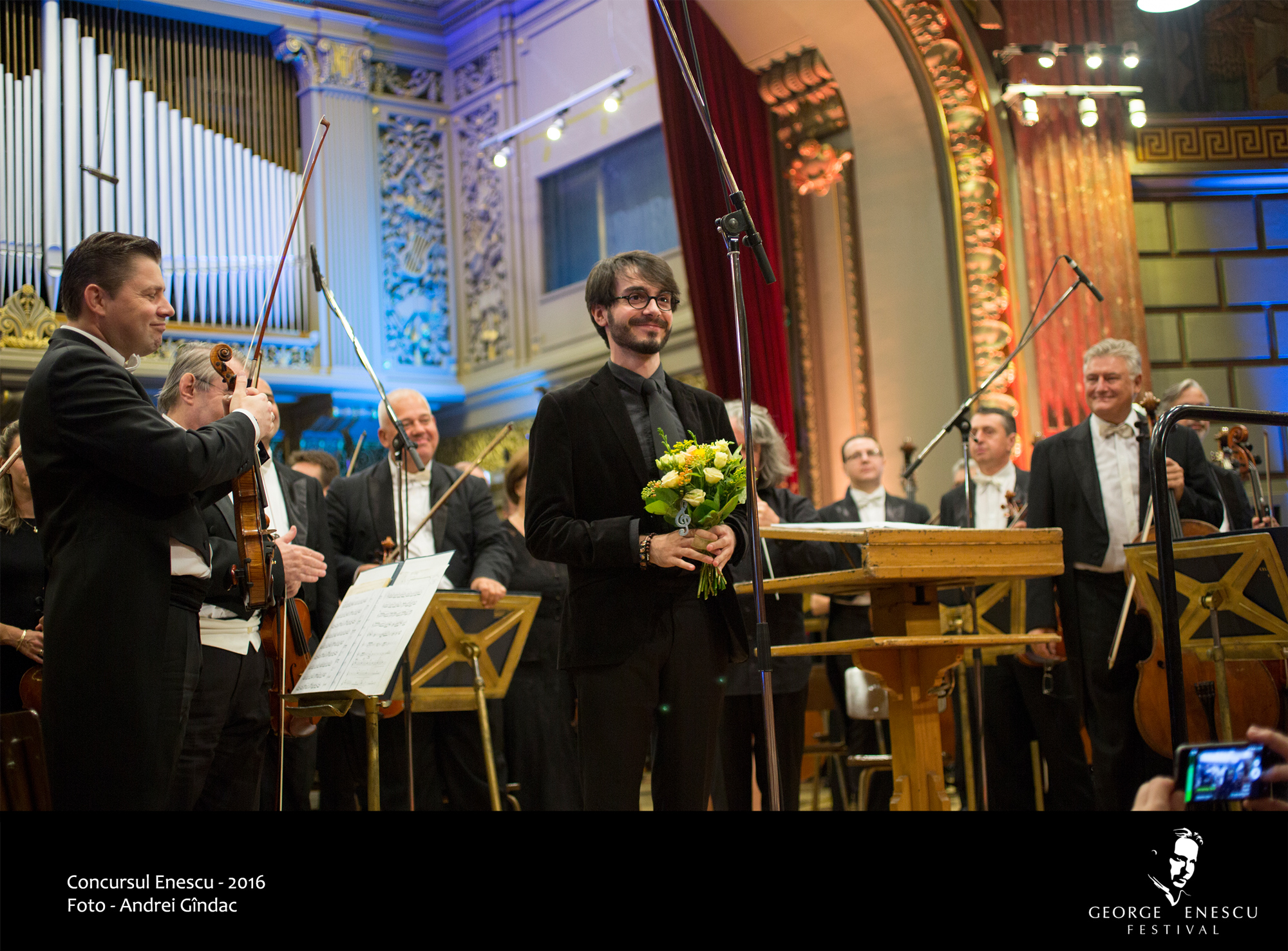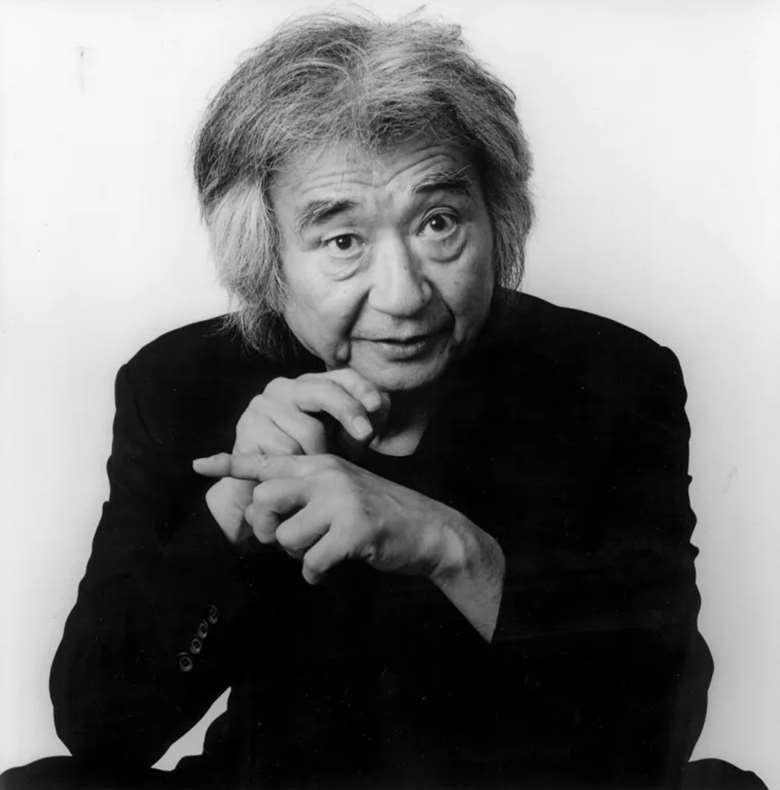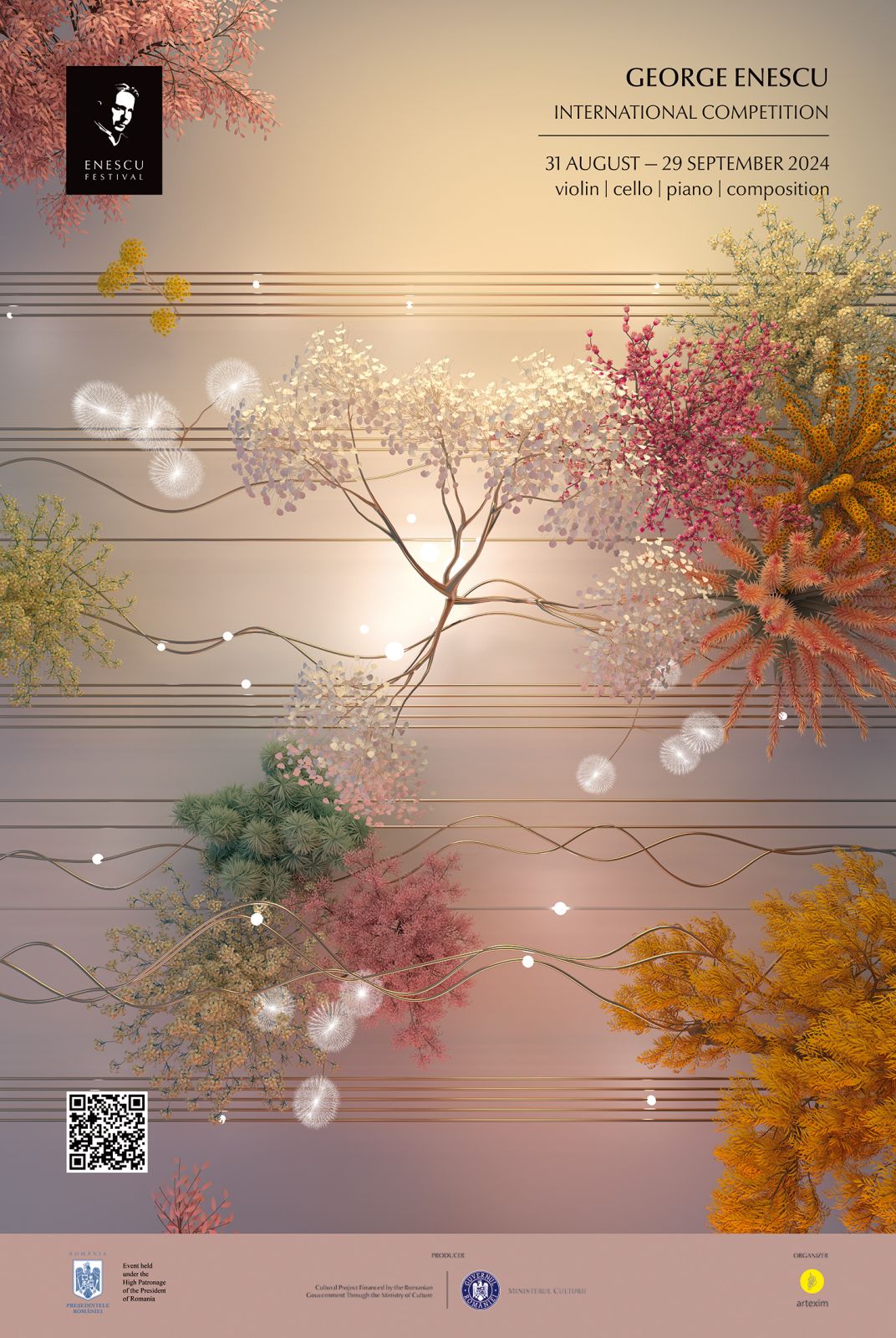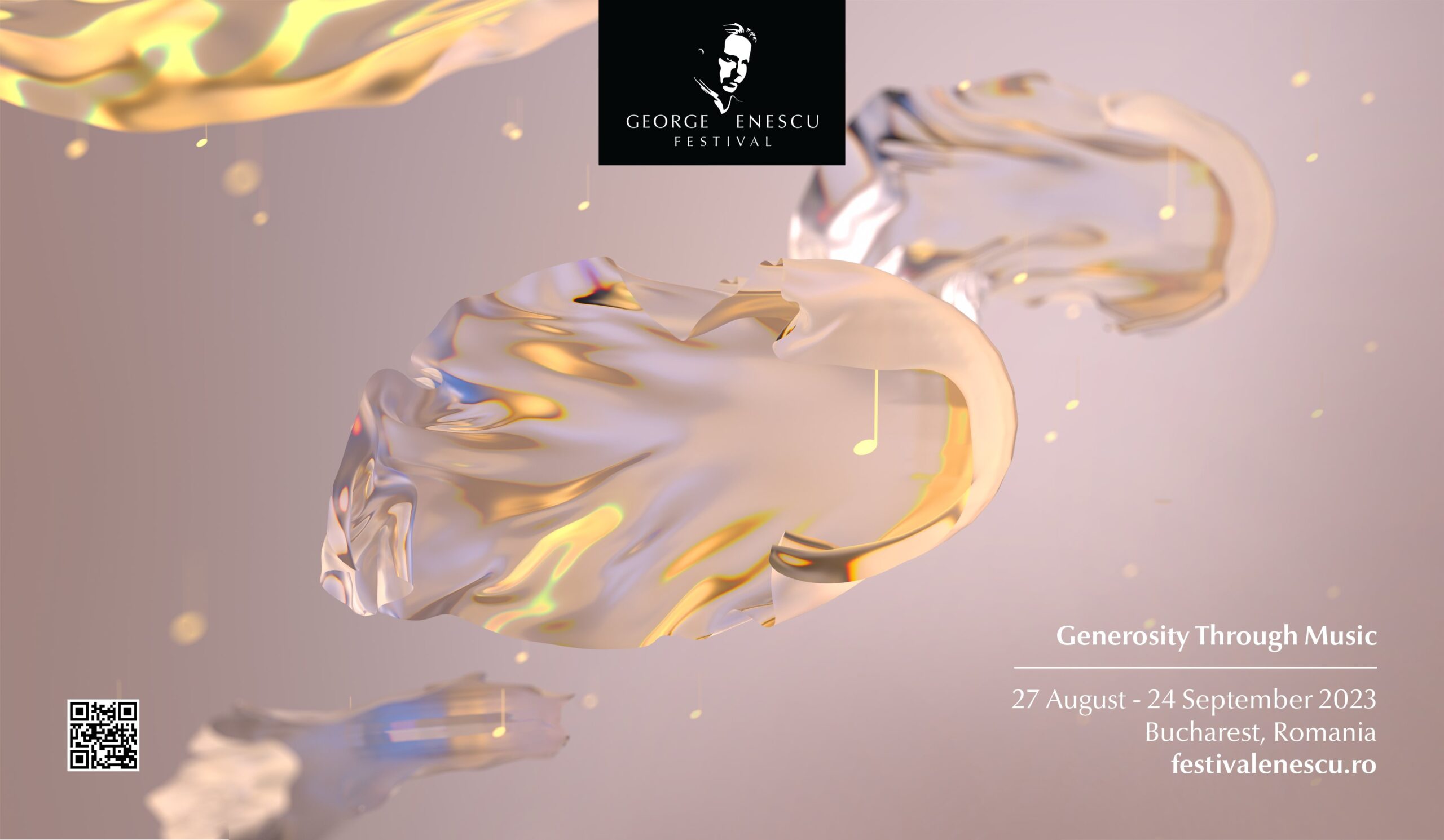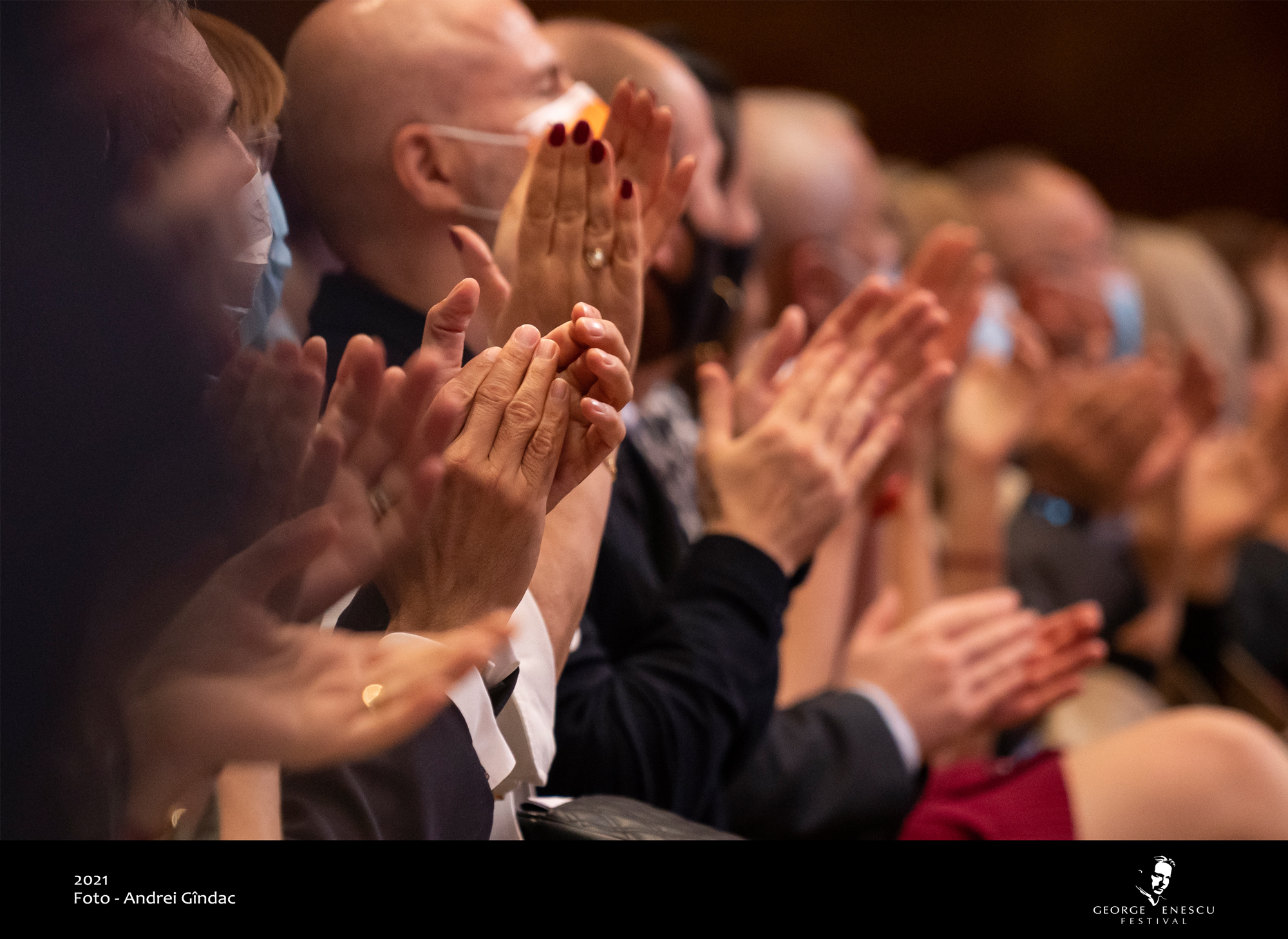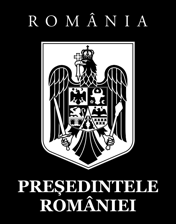Composer Sebastian Androne-Nakanishi
Appreciated by international juries, audiences and critics for his impeccable technique, his expressive and sophisticated musical style, both harmonically and melodically, Sebastian Androne-Nakanishi (born 1989) is an interesting, original artist, always searching for the philosophical layers of music. He studied with Dan Dediu at the National University of Music in Bucharest, where he also acquired a PhD; he also studied in Birmingham, Paris and Zürich, where he is currently based. Sebastian Androne-Nakanishi is a creator of contemporary classical music as well as film and theatre music, and in 2014 he won one of the most important awards in his career: the Grand Prize at the George Enescu International Composition Competition, symphonic music section, with the work Tektonum for orchestra and synthesizer. Other prestigious prizes followed, such as the Golden Eye trophy awarded by the Zürich Film Festival and 1st prize at the International Choral Competition in Japan. As for this year, Sebastian Androne-Nakanishi was named Composer of the Year at the International Classical Music Awards for his work Lan Huahua – The Dark Blue Flower. He is therefore an artist with an impressive resume, passionate about music but also about other domains, which he talks about in the following interview.
Sebastian Androne-Nakanishi, eight years have passed since you won the George Enescu International Competition, symphonic section, with the work Tektonum. How do you remember the atmosphere of this competition and what impact did it have on your subsequent career?
I remember I was in a big hurry to send in the work, I think I sent it in at the last minute. I ran to the Artexim office to submit it there. And since I have never written specifically for the competition, I had this piece that I had been working on for a very long time, which I ended up calling Tektonum, and I just thought: “let’s see what happens”. Of course, when I won it was a real shock, because this contest meant a lot to me, especially since it was the contest that my mentor had won a few years ago, Prof. Dan Dediu. I didn’t even realise how big this prize was until, at a masterclass abroad, I overheard someone whispering to another young composer like myself and saying “look, he is the one who won the Enescu Competition”. I thought that moment was wonderful.
Let’s talk about the piece you won the Enescu Competition with. You said at the time that it was a “compositional project born from an ingenuous joy of exploring, of materialising the sound from within”. What was the genesis of this work?
I’ve always loved these journeys outside of reality. Somehow, through the compositions, I was immersing myself in worlds that I was creating for myself. The joy was all the greater because in this world I could invite others, as in a roller coaster, to visit it. And some of my passions have always been astronomy, quantum physics. Then, this piece for me meant visualizing by sound the creation of the Universe. When I said “from within”, I certainly had no way of objectively representing the creation of the Universe, and so I resorted to certain licenses and certain things that were completely personal. For example, if I let myself be inspired by the formation of the first galaxy, by the Big Bang, by the formation of the first atom, that doesn’t mean that I blindly applied the particularities that I found in science, but I also let myself be guided somehow by intuition. Of course, the ending has nothing to do with science as I am going into a metaphysical area. I’m even afraid to talk about that particular section because it’s very, very intimate and personal.
In 2016 the work Tektonum had its world premiere, also within the Enescu Competition, performed by the George Enescu Philharmonic Orchestra, conducted by Horia Andreescu. What sensations did this experience give you – listening to your own work at the Romanian Athenaeum?
Maestro Horia Andreescu took extraordinary care of me. I think it was the second or third piece of mine performed by an orchestra in Romania. I remember that he invited me to his place to discuss the score and he was very patient with me. Of course, Tektonum is a monumental and difficult work; however, its strength and essence were fabulously brought out by Maestro Horia Andreescu and the George Enescu Philharmonic Orchestra. I am grateful to them for that. It was extremely moving. The work also has a synthesizer that I had to control and make certain adjustments during the concert.
“Any act of creation is first an act of destruction” – this is the motto you used for the Enescu Competition. What is the reason behind this choice?
Of course, the quote is not mine, if I’m not mistaken it’s Picasso’s, and I remember someone in the music critique was not too lenient towards this choice of mine. If we think of the star that warms our planet, it is made up of elements created in the furnaces of the first stars that were destroyed by supernovae. And that’s when it seemed so poetic of me to use this quote because I, too, when I work on my music, witness destruction and creation. It takes so much undoing to create something… And oftentimes there are materials with the role of “placentas” – that is what I like to call them, that produce new material, but they don’t appear in the piece afterwards. They’re just there to propel, to generate the material that I eventually end up putting into the work. And then, of course I must agree with Picasso, that every act of creation is also an act of destruction.
Since you have an extraordinary competitional experience, I would like to ask you to what extent is the George Enescu International Competition an international platform for musicians at the beginning of their career and what advice would you give a young composer before submitting a score to this competition?
I would start with the advice. I have met many colleagues over the years, especially at summer masterclasses, most of them foreigners, but also from Romania, who literally hunt competitions. One of them, if I remember correctly, made a career out of it. Virtually, they were targeting jury members, what they liked, the winning pieces from past years. I have never done that. Admittedly, that does not mean I have entered 25 competitions and won them all. I think you have to learn to lose too. However, if you are as honest as you can be and write your music with love and, at the end of the day, you have a kind of pretentiousness about technique, about what has been done so far and you don’t ignore but try to appropriate everything that has been written so far, I think you have a much better chance of discovering yourself. That doesn’t mean that this obsession with finding your own voice has to cause stress or move your hand when writing. It seems to me that’s a danger too. But an extraordinary composer and teacher very dear to me, Doina Rotaru, used to tell me: “Hey, it is you the one who must like it”. If you like your music and you’re happy with it, I think that is reason enough to enter competitions and give it a try. But know that it’s also down to luck. After all, I’m aware of that too.
The Enescu Competition is a launching platform in the meaning that the moment you go to apply for a summer masterclass, for example, and people there see the Enescu Prize in your record, of course you are taken into consideration, you are put at the top of the list. And what’s more, your work gets to be played by one of the best orchestras in Romania. It is a great thing for a contemporary composer to have his works performed, especially when it comes to orchestral pieces.
Sebastian Androne-Nakanishi, you have an absolutely impressive portfolio of awards, and this year you have achieved an extraordinary success: the International Classical Music Awards jury has named you Composer of the Year and has characterized you as “a true talent, showing creativity and versatility in both contemporary music works and soundtracks composed for film and theatre”. What do you think of winning this award now, and how does it feel to see your work and talent appreciated at such a high level?
It is very flattering. I honestly tell you that I oftentimes feel that I don’t deserve this honor and joy, because I see that there are so many others who are perhaps more talented; I don’t know who can distinguish who is more talented than another… But I am absolutely aware that there are others who have worked much harder than me. On the other hand, I think I speak for a lot of composers when I say that sometimes there are a lot of doubts. Especially in today’s context. We think about what we manage to do with our lives. We write music, of course, but this bohemian attitude can work up to a point. Later on, the current context, the family situation, forces us to think a little down to earth. And then we need this support, this pat on the shoulder that says “Yes, it is okay, you’re doing well what you’re doing, go ahead”. I was just talking to another very dear professor of mine, Mrs. Olguța Lupu, about the fact that a composer nowadays can hardly support his family just by composing. And maybe that’s how it was for generations, I don’t think that has changed much… She said that you also have a duty to the music itself, to those who listen to you, to those who discover new things through your music. I am even afraid to verbalize these things because I am aware of the risk that we run as artists, of becoming megalomaniacs, of our own status “going to our heads”. And I try to avoid that, but sometimes I end up in the other extreme. Then, I think that such appreciation, such as from the ICMA Awards, balances these thoughts, if you are careful to stay grounded.
Do you think you will participate in future composition competitions?
Oh, but I so miss participating! Unfortunately, I don’t think I will have the time. I have a baby now. I’m very excited and I don’t want to blame him or have him read the interview later and say “aaa… it is my fault you didn’t participate”. No, it’s not just that. I somehow find my inspiration through my child and I really think I had a lot to learn from him. I think it’s another chapter in my life. As for competitions, if I ever have time again, I’ve been eyeing a competition in Switzerland on contemporary music and orchestra for a very long time. But it would take a lot of time invested. It took me over a year and a half to compose the work Tektonum with which I won the Enescu Competition. And I remember that I wrote a provisory ending for it to present to the university, and the ending that eventually appeared in Tektonum, I think I wrote it after about six months of thinking and researching. I could not find a good ending. Eventually the ending came up with the idea of using Bach’s theme from Passacaglia. Sometimes, if you write a piece in a hurry, it is better not to enter it in the competition. And then, if I don’t have that necessary time, I don’t think there would be any point in wasting time on it. Especially since I may be wasting precious time out of my child’s life.
I’m working on other projects but unfortunately I have reached burnout. Health is not to be trifled with, that is one piece of advice I could also offer to colleagues or composition students. At one point I had about six projects going on at once, mainly for financial reasons, and it got to some extremes. Now I have to be more careful, but I still take on projects.
Interview by Larisa Clempuș, Romanian Musical Critics’ Union
English version by Ana Lica
